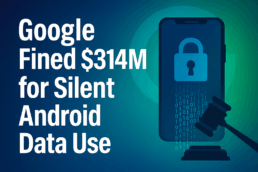Google Ordered to Pay $314 Million for Quietly Using Android Users’ Mobile Data
Jury Says Background Data Use Broke California Law
A jury in San Jose, California, has told Google to hand over roughly $314 million after deciding the company tapped into Android users’ mobile-data plans without permission. The verdict, delivered at the close of a month-long trial that began on June 2, 2025, ends a class-action lawsuit first filed in August 2019. Jurors agreed with the plaintiffs’ claim that Android phones keep talking to Google’s servers even when a handset appears to be doing nothing, and that the chatter rides over cellular networks instead of waiting for a Wi-Fi connection.
How the Data Transfers Were Discovered
During the trial, lawyers for the Android owners walked the jury through two experiments that highlighted the traffic. In the first test, engineers set up a Samsung Galaxy S7 straight out of the box, kept the factory settings, and linked it to a brand-new Google account. Over a typical day, the phone exchanged 8.88 megabytes of data. About 94 percent of that flow went back and forth between the device and Google’s own computers. All of this happened while the phone lay untouched on a desk, its screen dark, with no visible apps running.
The packets contained things such as system logs, network status reports, and lists of apps that had been opened. The plaintiffs’ experts said those records are not urgent and could just as easily wait until the phone reconnects to Wi-Fi, sparing customers’ data caps. They also pointed out that Android gives users no simple switch to confine these background uploads to Wi-Fi only.
A second study from 2018 told a similar story. With the Chrome browser open but sitting in the background, an idle Android phone sent around 900 silent transmissions in 24 hours. An iPhone running Safari under the same conditions generated far fewer calls home. That contrast, the lawsuit argued, showed Google had alternatives if it chose to limit the traffic.
Google Plans to Fight the Ruling
Google said it will appeal. In a brief statement, the company argued that the disputed transmissions support “core services that keep Android devices secure, fast, and reliable.” Google also noted that its user agreement spells out the data exchanges and that customers give consent when they turn on the phone. Company lawyers told the court that moving the uploads to Wi-Fi alone could slow security checks, push software updates off schedule, and leave devices exposed.
The jury, however, focused on California’s consumer-protection rules and sided with the phone owners. By making Android rely on mobile data—even in the background—Google shifted a cost onto people who may pay per gigabyte or face throttling when they exceed monthly limits, the panel concluded. They called that burden “mandatory and unavoidable.”
Wider Pressure on Big Tech Over Privacy
The payout is the latest in a string of privacy-related hits against Silicon Valley heavyweights. In May 2025, Google agreed to spend nearly $1.4 billion settling two lawsuits in Texas that accused the firm of tracking users’ locations and building a facial-recognition library without clear permission.
Meta, the company behind Facebook and Instagram, is also locked in a high-stakes fight with regulators. In April, the European Commission fined Meta €200 million (about $227 million) under the Digital Markets Act, saying its “pay-or-consent” ad model forces people toward personalized tracking. Meta has already filed an appeal, warning that regulators are pushing it toward “a potentially unviable business model.”
The California decision against Google may escalate calls for tighter rules on how tech platforms collect and move data behind the scenes. Privacy advocates argue that most users never realize how much their phones talk to company servers or that those bytes can eat into limited mobile plans. Industry groups counter that real-time telemetry helps catch bugs, defend against hackers, and make apps feel snappier.
For now, Google faces a large bill and the possibility of more courtroom battles if similar suits appear in other states. The appeal could stretch on for months or even years, keeping the debate over background data—and who should pay for it—squarely in the public eye. As regulators on both sides of the Atlantic keep turning up the heat, the ruling underscores a growing consensus: the true cost of “free” digital services is under sharper scrutiny than ever before.
